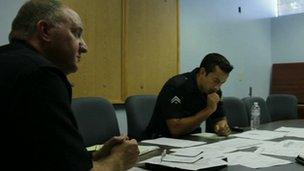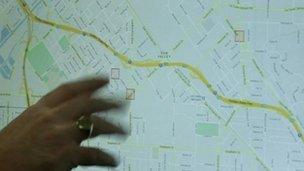Predicting crime 'cut Medway street violence by 6%'
- Published

LAPD says the technique reduced property crime by 12% within six months
A four-month trial of predictive policing pioneered in Los Angeles reduced street violence in Medway by 6%, according to Kent Police.
The system uses computer analysis of human behaviour and historic crime data to predict crime "hotspots" to deploy police officers.
It was trialled in Medway in December last year and rolled out across Kent in April.
Kent Police Federation said the results needed proper evaluation.
The force is using predictive analysis software produced by PredPol, a company based in Los Angeles, California.
The software uses past trends and current information to identify "boxes" where there is likely to be trouble in the coming few hours.
Los Angeles Police Department (LAPD) says that within six months of introducing the technique in 2011 property crime fell 12% compared with the previous year.
Ann Barnes, Kent Police and Crime Commissioner, approved the £130,000 annual expenditure when she was chair of the now-abolished Kent Police Authority.
She and Chief Constable Ian Learmonth are taking part in an "international day of activity" with beat officers to raise awareness of the new policing method.
Police forces in the US are also taking part in their own predictive policing day.

Predictive policing was developed and pioneered in Los Angeles, California
Kent Police is one of several forces in the UK to have trialled similar technology, including Greater Manchester and West Yorkshire Police.
Ian Pointon, chairman of Kent Police Federation, said that for his members, the jury was still out on the effectiveness of predictive policing in the light of staffing cuts.
"With 500 fewer officers now, have they got the time to actually go and patrol these boxes that predictive policing provide?" he said.
"Yes, it is useful to know where to place officers and we have done that for many many years in Kent through intelligence-led policing.
"But of course there are still demands from the public for police officers to attend and they are going up, particularly with the introduction of the 101 number.
"And are there too many boxes?
"We are using it to try and reduce a much wider range of crimes than the Americans used it for.
"They targeted just grand theft auto and burglaries but they hadn't been doing intelligence-led policing before that."
- Published29 October 2012
- Published18 September 2012
- Published30 June 2012